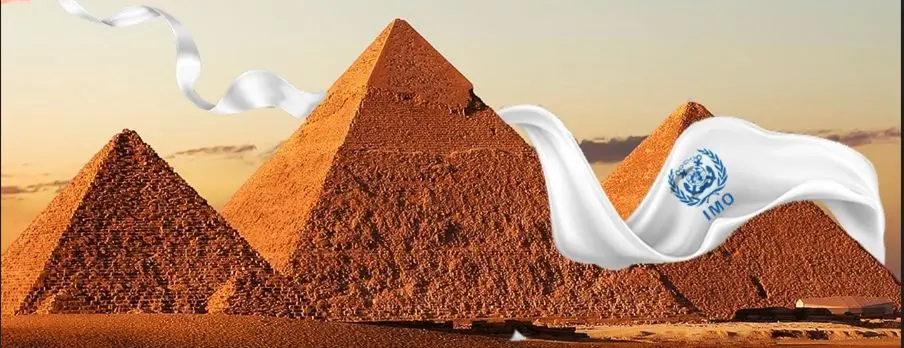Egypt wins membership IMO Council
Kamel el Wazir, Minister of Transportation, praised the nations chosen in categories (A) and (B). He continued by saying that Egypt is keen to carry out the IMO's operations and aims, indicating the importance of Egypt in enabling the flow of international trade between the East and the West.
He continued by stating that Cairo had developed an integrated maritime policy to improve the effectiveness of the maritime transport supply chain by revitalizing all harbors and growing the Egyptian commercial fleet. The minister emphasized that the Egyptian government implemented an electronic port management system and made considerable efforts to activate the single-window system to streamline procedures and business transactions at harbors.
EGYPT re-elected as a member of the IMO Council
2022-2023
At a summit in London, the 40-member nations of the IMO Council for the 2022–2023 term were chosen. The IMO Council serves as the "executive organ" responsible for monitoring the activities of international shipping and carrying out nearly all of the functions of the IMO Assembly, except providing recommendations to governments on marine safety and pollution management.
Since 1977, Egypt has been a member of the Council as part of the Ministry of Transportation's strategy to monitor this issue and remove any barriers. Despite the circumstances of the Coronavirus (COVID-19) epidemic, Egypt was still able to achieve this prestigious success, which benefits Egypt's maritime network internationally.
Egypt is keen to participate fully in each of the executive board's core and subsidiary committees. The Egyptian delegation attended the organization's council elections under the direction of Rear Admiral Reda Ahmed Ismail, Head of the Maritime Transport Sector.
What is IMO Council?
The Council of the International Maritime Organization is an organization founded by the UN (the United Nations) in 1949 to regulate and organize the shipping logistics process to preserve the environment and facilitate global trade.
The major goal of the IMO is to create and uphold a thorough regulatory framework for shipping, and as of right now, that framework encompasses issues related to maritime security, efficiency, and environmental and legal issues.
IMO roles and responsibilities
- Coordinate the Organization's organs' work.
- Take into account the Organization's proposed work program and budget projections and present them to the Assembly.
- Assemble reports and suggestions from the Committees and other organs, and send them to the Assembly and the Member States together with any necessary comments and recommendations.
- Subject to the Assembly's approval, appoint the Secretary-General.
- Subject to Assembly approval, enter into agreements or arrangements about the Organization's connection with other organizations.
Membership IMO Council
Elected the 40-member council to two-year "biennium" terms. Composed of all IMO Member States, typically meets for the regular session once every two years in its headquarters in London, United Kingdom, separated into 3 categories (a), (b), and (c).
With 10 member states in Category (a) that have the greatest interest in providing international shipping services, 10 member states in Category (b) that have the greatest interest in international seaboard trade, and 20 member states in Category (c) that have "special interests in maritime transport or navigation" and are chosen to ensure that all significant geographic areas are represented.
Category (a)
Includes the following countries: Panama, China, the Russian Federation, the United Kingdom, Japan, Norway, the Republic of Korea, Greece, the United States, and Italy.
Category (b)
Includes the United Arab Emirates, Australia, Sweden, Canada, France, Germany, India, Brazil, the Netherlands, and Spain.
Category (c)
Includes Morocco, The Bahamas, Qatar, Belgium, Chile, Cyprus, Denmark, Egypt, Indonesia, Jamaica, Mexico, Kenya, Malaysia, Malta, Turkey, the Philippines, Saudi Arabia, Singapore, Thailand, and Vanuatu.
Egypt's important logistics role in global trade
Egypt's abilities, knowledge, and position as a leader in the field of international maritime transport and navigation, as well as its geographic location at the center of the planet and its maritime borders along the Mediterranean Sea, Red Sea, and Suez Canal, reflect the confidence that the world has in Egypt's diplomacy in the international freight business.
Due to its location at the nexus of Africa, Asia, and Europe, Egypt continues to be one of the most strategically significant countries in the world. Over the past 150 years, the Suez Canal has played a key role in facilitating international trade, particularly for oil.
Egypt has nine ports, three of which—Alexandria, Port Said, and Suez—are the busiest due to its lengthy coastline. The majority of the nation's imports and exports, as well as most of its passenger traffic, are handled by Alexandria, which has a lovely natural harbor.
The berthing and loading facilities found at Alexandria do not exist in Port Said, which is the Suez Canal's northern entrance. The primary purpose of Suez is to serve as a port of entry for products from Asia and minerals and petroleum coming from the Red Sea coast of Egypt.
Enhancing Egypt’s role in foreign markets
As ports handle over 65% of Egyptian exports, maritime and related logistics services play a significant role in the Egyptian economy. Additionally, there are many connections between maritime logistics services and other industries. Increasing their effectiveness can have a big beneficial ripple impact, especially by boosting non-oil exports, luring in foreign direct investment, and generating jobs.
The achievement of Egypt's goals to enhance freight trade with foreign markets would depend heavily on the country's ability to manage its urban expansion, which is already underway in many regions of the nation. We need to enhance private investor participation if we're going to accomplish these aims.
you can also check out this article to learn more about Egypt's role in the international textile trade: Egypt’s Textile Exports: From Pharaohs to Top Fashion.

Egypt wins Membership IMO Council